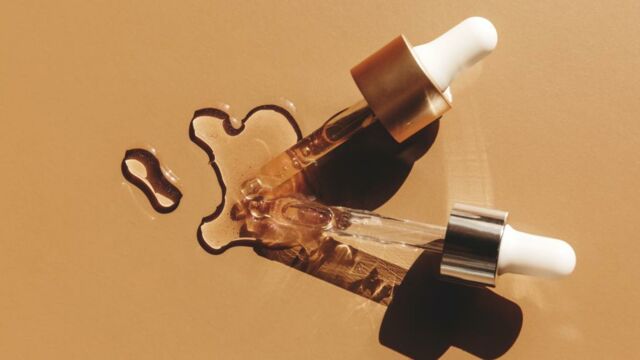Thanks to all the time we’ve spent inside over the last year, many of us have ditched makeup in favour of what’s underneath - our skin.
Discover our latest podcast
In recent years skincare has become one of the fastest-growing markets in the beauty industry. However, despite an endless stream of new products and ingredients and a swarm of skinfluencers educating us on how to use them, many age-old skincare myths are still circulating, some of which can even be harmful to the skin.
Here are some common skincare myths that you need to stop believing:
Myth 1: Stinging or burning means your product is working
If you’ve ever felt a stinging after putting on a product and thought, ‘wow, it must be working really well’, think again. Stinging and burning sensations are actually a sign that your skin is irritated by the product, and it could be causing some damage. This is especially common for some fragrances, alcohol and essential oils. If your skin feels burning, stinging, or hot and itchy after applying a product, then it’s usually a sign you should wash it off.
However, some ingredients such as vitamin C, retinol and chemical exfoliants also can cause the skin to tingle if you have a compromised moisture barrier and is an expected effect when using these products. That’s why it is recommended to start using these products at a low concentration and refrain from combining them with other acids.
Myth 2: Anti-ageing products are only for mature skin
Because anti-ageing products are often marketed to people with fine lines and wrinkles, it can be easy to think that they are only beneficial for mature skin. But, the signs of ageing are much easier to prevent than to treat, making anti-ageing products an excellent choice for younger people also.
Ingredients such as retinol are also seen as a purely anti-ageing product, but the benefits can go so much further than that. Retinoids help increase skin-cell turnover and boost collagen production, making them an effective product for acne and pigmentation. Ellen Marmur, M.D. told Vogue:
Your mid-twenties are a great time to start using retinol. Many patients who have used it for years swear by it.
Myth 3: If a product breaks you out, it’s bad
Some pore cleansing treatments and exfoliants like retinoids, antibiotics, benzoyl peroxide and chemical exfoliants can initially cause you to break out, leading you to believe that these products are harmful to your skin.
This reaction is actually expected and referred to as purging. Products that increase skin cell turnover can speed up the skin’s cycle and force underlying breakouts to move to the surface. As the product begins to work over some weeks, your skin’s purge will lessen.
However, if a product continuously causes new inflammatory acne, this is a breakout, indicating you may be sensitive to the product and should discontinue use. This is more common in inactive products such as cleansers, moisturisers, hydrating toners and oils.
Myth 4: Natural skincare is better
While many natural skincare ingredients can be hugely beneficial to the skin - like seaweed - several ingredients can be irritating when used incorrectly, both in DIY and formulated skincare environments. Some of these ingredients also require vast amounts of land and product to make, sometimes causing them to be less beneficial for the planet. Chase Polan, the founder of sustainable skincare label Kypris, told Byrdie:
I think that most consumers assume that because something is natural or nature-derived that means it is both safe and/or sustainable.
Polan continued: ‘Both assumptions are incorrect. For example, essential oils from plants, when misused, can cause horrible burns or reactions. Another concern is that these natural ingredients can require tremendous amounts of plant material in order to create the ingredients. When something is grown, arable land, water, and a workforce must be dedicated to their care and procurement. This can have a myriad of implications for the resources, environment, and geopolitics of a region.’
Myth 5: You only need SPF in the summer
Sunscreen protects the skin from UV rays, and these rays are present no matter the season or weather and can penetrate windows and clouds. These UV rays can cause the skin to suffer sunburns, hyperpigmentation, fine lines and wrinkles, and loss of volume and elasticity.
Victoria Schofield, Dermalogica's Education Manager, explained to GQ: ‘You should be wearing SPF daily, whatever the weather.’
UVA rays are present at the same strength from dusk till dawn all year round and penetrate cloud cover, thus skin damage can occur in the colder months. UVA also penetrates glass and windows – so if you’re working indoors, but near a window, your skin is still vulnerable to damage.
Additionally, some products such as retinoids and acne-fighting antibiotics can also be photosensitive, meaning they could trigger adverse skin reactions when exposed to UV rays.
To protect your skin from this kind of free radical damage, you should apply a broad-spectrum SPF of at least 30 every day in two to four-hour intervals.
Myth 6: Oily skin doesn’t need moisturiser
Those with oily skin may believe that a mosituriser will only contribute to sebum production or clog up their pores. However, just because your skin is oily doesn’t mean it’s well hydrated. Often, dehydrated skin can produce more oil to compensate for lack of moisture.
Dr Eric Schweiger, the founder of Schweiger Dermatology Group in New York City, revealed to Bustle: ‘By skipping the moisturiser, your skin will dry out and in turn rebound with more oil production, which can actually cause more breakouts.’
Instead, those with oily or acne-prone skin should look for water-based, non-comedogenic moisturisers that contain ingredients like hyaluronic acid, squalane and glycerin. These types of moisturisers help lock in moisture and are unlikely to cause breakouts.















